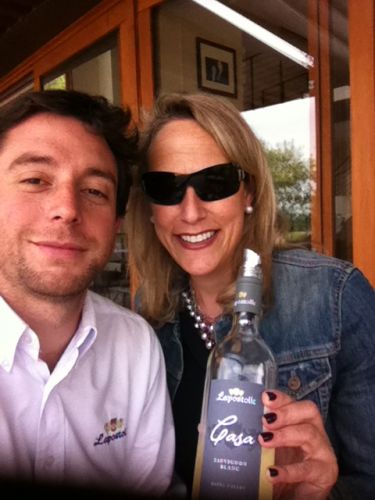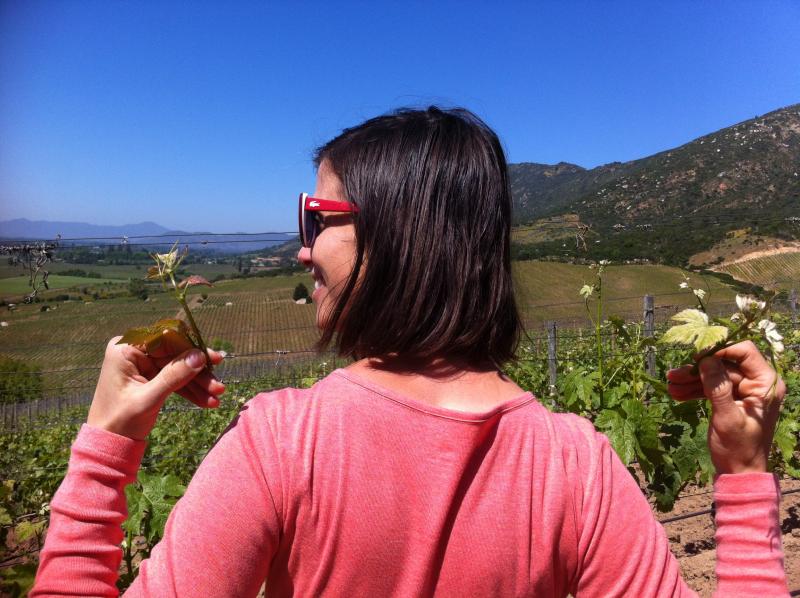 Lapostolle brings home its country's top award as it wins the Double Gold Medal and received overall excellent results in this third edition of the event, organized by the ”Asociación de Agricultores Orgánicos Centro-Sur”. Congratulations to my friends at Casa Lapostolle and especially, Alexandre Marnier Lapostolle, Andrea Leaon and Diego! Cheers to all in Colchagua Valley!
Lapostolle brings home its country's top award as it wins the Double Gold Medal and received overall excellent results in this third edition of the event, organized by the ”Asociación de Agricultores Orgánicos Centro-Sur”. Congratulations to my friends at Casa Lapostolle and especially, Alexandre Marnier Lapostolle, Andrea Leaon and Diego! Cheers to all in Colchagua Valley!
Lapostolle Cuvée Alexandre Carmenère 2011 won Double Gold Medal and was chosen the best organic wine from Chile, the highest award in this important Chilean organic wine competition.
Bocanariz wine bar in Santiago was the scene for a morning of blind tastings in which 10 Chilean experts (winemakers, sommeliers and journalists) judged 45 wines from a total of 12 wineries.
All Lapostolle wines submitted obtained an accolade: Cuvée Alexandre Merlot 2011 won a gold medal and the Cuvée Alexandre Chardonnay 2011 and Syrah Las Kuras 2010 both won silver medals.
Lapostolle began farming organically from 2006. Since 2011 all their vineyards are certified organic by the German body of Certification CERES©. In addition, the winery also practices Biodynamic agriculture, certified by Demeter©; has ISO 14001 environmental certification, and is certified Carbon Neutral Delivery by The Carbon Neutral Company© for reducing to net zero de CO2 emissions from their wine exports.
Can you guess which is the carmenere leaf? 
Seen left, Winemaker, Andrea Leon. Above CIYYPEEK Patti Neumann and Asst Wine Maker/Brand Ambassador Diego Urra Gosselin.
Some LAPOSTOLLE wine factoids:
I was lucky enough to tour the world famous winery known as Clos Apalta. Spiraling down underground 6 levels, the wine tour was an intimate detail or how this world renown wine is produced step by step. Six to be exact. Each floor or "paso" represents a stage of the process.
Stage 1: The process is entirely organic, including hand-stemming the grapes no machines are used. The machines used in other winery processes are replaced at Clos Apalta with 60 women who, do by hand, in an average of 28 hours, what a machine would do in 3 hours. The grapes, after being picked, stemmed, selected and separated, are placed in a portable tank, known as R2D2, (seen left) that transports the grapes to its next stage, in lieu of a pump system. 1-2 year aging, modern french cave, all granite floors throughout. The winery has an avid attention to integrating the environment, nature into all of its work and lifestyle.
Stage 2: Fermentation in a French oak tank. The masuration process takes two weeks time where the skin and seeds are separated from the the wine. The stage 2 fermentation area is kept wet and humid, keeping the oak wood wet in the room containing 21 enormous vats.
Stage 3: 1 year aging- each vat is separated creating "lots".
Stage 4: 1 year blended wines
Stage 5 final blend
Stage 6 bottling, embodying sum of all stages into the Case/House of Lapostolle/Apalta.

- FRENCH IN BIRTH, CHILEAN in Nature-many vines came from French Origin
- 200,000 cases total production from the entire Lapostolle winery.
- Production average of 4,500 cases of Clos Apalta.
- Borobo between 250 to 400 cases-not available in the USA
About 75% red wines (tinto)
About 25% white (blanco) wines
More information: www.lapostolle.com and read about CITYPEEK's expereince on the ground in Chile http://www.citypeek.com/node/64015
Connect Real-Time with CITYPEEK Patti's Food, Wine & Travels:

 Facebook: Click
Facebook: Click
 Twitter: Click
Twitter: Click
 Instagram: Click
Instagram: Click
 Linked In
Linked In

 Add Events
Add Events Food, Wine & Travel News
Food, Wine & Travel News
 Lapostolle brings home its country's top award as it wins the Double Gold Medal and received overall excellent results in this third edition of the event, organized by the ”Asociación de Agricultores Orgánicos Centro-Sur”. Congratulations to my friends at Casa Lapostolle and especially, Alexandre Marnier Lapostolle, Andrea Leaon and Diego! Cheers to all in Colchagua Valley!
Lapostolle brings home its country's top award as it wins the Double Gold Medal and received overall excellent results in this third edition of the event, organized by the ”Asociación de Agricultores Orgánicos Centro-Sur”. Congratulations to my friends at Casa Lapostolle and especially, Alexandre Marnier Lapostolle, Andrea Leaon and Diego! Cheers to all in Colchagua Valley!

